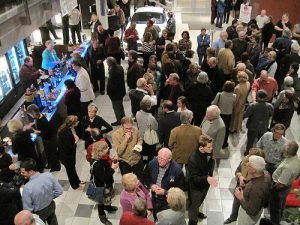These days, when digital devices rule the roost, it’s often hard to make the case for the old-fashioned rituals of social interaction.
What seems to be going the way of the dinosaur is the kind of camaraderie and good fellowship that can only take place face-to-face, within the context of the public square and its institutions such as theatres and museums, where conversations are born of serendipity.

Yes, I know that texting is a marvelous way to keep in touch, but there’s something about watching a performance or looking at objects within the company of others that does a better job of bringing us together.
Last night’s performance of The Merchant of Venice at GW’s Bett’s Auditorium was a case in point. Though much to my dismay, several students seated right in front of me spent much of the show texting away, most of the audience – especially those who stayed for the post-performance talk-back – forged a relationship with the play and its actors that was alive, rather than mediated. For several hours on a Saturday night in November, a disparate group of people found common cause in a 400 year old play.
Much the same can be said of visiting a museum and of looking at the real thing rather than at simulacra or avatars. There’s an immediacy to the experience, a sense of belonging to something larger than one’s self, that is well worth celebrating, much less preserving.
But don’t take my word for it. This Tuesday evening, November 8th, at 7 p.m., at GW’s Jack Morton Auditorium (School of Media & Public Affairs), NYU University Professor Barbara Kirshenblatt-Gimblett will be speaking on “The Elusive Object: The Meaning of Things in a Digital Age.” Be there.


